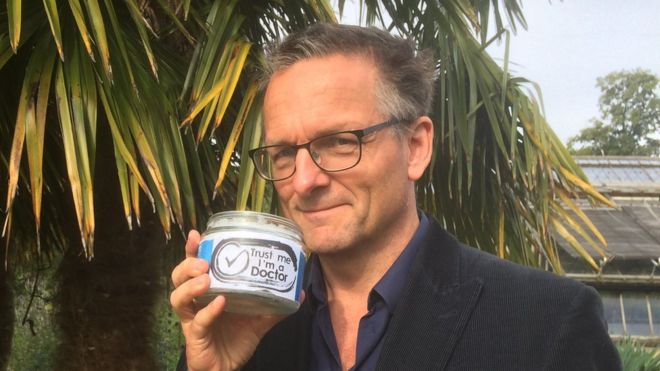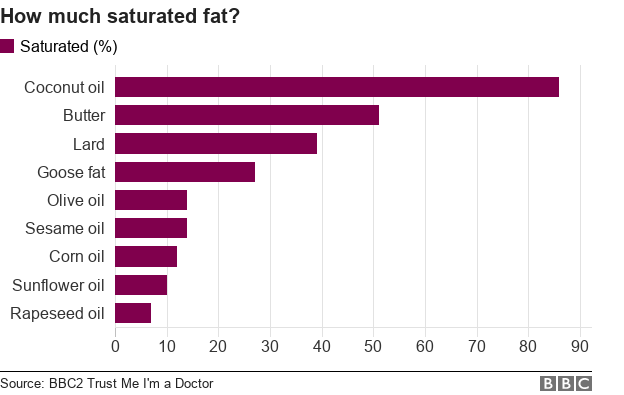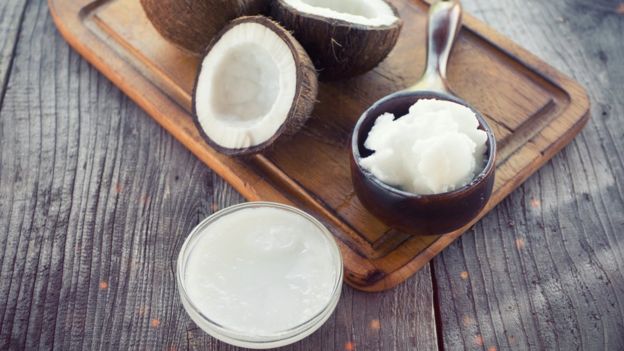
Sales of coconut oil are rocketing, propelled by celebrity endorsements and claims that drinking the stuff will cure everything from bad breath to digestive disorders.
Actress Angelina Jolie-Pitt is said to have a tablespoon or so with her breakfast most mornings, while model Miranda Kerr says she not only adds it to salads and smoothies, but she cooks with it and splashes it on her skin as well.
The health claims that swirl around coconut oil are treated with a great deal of scepticism by scientists.
If anything coconut oil is seen, in the scientific community, as an unhealthy fat. It is very high in saturated fat (86%), even more so than butter (51%) or lard (39%).
The reason that foods rich in saturated fats are frowned on is because eating them causes a rise in blood levels of LDL (low density lipoprotein).
LDL is known as "bad cholesterol" because high levels are linked with increased risk of heart disease.
On the other hand, saturated fats - which are particularly bad for you - also tend to raise HDL, "good" cholesterol, which has the opposite effect. It is possible that a particular food can raise overall cholesterol levels, yet still be heart-friendly.
Cholesterol check
So is coconut oil a cholesterol-busting wonder food, as some claim, or is this all dangerous hype?
Despite all the sound and fury that surrounds coconut oil, there have been surprisingly few human studies carried out to test specific health claims.
So for the current BBC2 series of Trust Me, I'm a Doctor, we thought we should help organise a trial.
The Trust Me team started by contacting Prof Kay-Tee Khaw and Prof Nita Forouhi, both eminent Cambridge academics.
With their help, we recruited 94 volunteers, aged 50-75 and with no history of diabetes or heart disease, and designed a study to assess what effect eating different types of fat would have on their cholesterol levels.
We began by randomly allocating our volunteers to one of three groups. Every day for four weeks, the first was asked to eat 50g of extra virgin coconut oil - that's about three tablespoons full.

The second group was asked to consume the same amount of extra virgin olive oil.
Olive oil is a key element of the Mediterranean diet, which is widely seen as being extremely healthy.
And the third was asked to eat 50g of unsalted butter a day. Again, that adds up to just over three tablespoons.
The volunteers were told that they could consume these fats in whatever way they pleased, as long as they did so every day for the whole four weeks.
- Coconut oil 'as unhealthy as beef fat and butter'
- Diet debate: Is butter back and is sat fat good?
- Top five celeb 'diets to avoid' in 2018
They were also warned that, because they were consuming an extra 450 calories a day, they might well put on some weight.
Before our volunteers started on their new high-fat regime we took blood samples to get baseline measurements, focusing mainly on their levels of LDL (the "bad" cholesterol) and HDL (the "good" cholesterol)
The importance of these two measures is that your heart attack risk is best calculated, not by looking at your total cholesterol score, but your total cholesterol divided by your HDL score. NHS Choices suggests that this figure should be below four.
So what happened? As expected the butter eaters saw an average rise in their LDL levels of about 10%, which was almost matched by a 5% rise in their HDL levels
Those consuming olive oil saw a small reduction, albeit a non-significant drop, in LDL cholesterol, and a 5% rise in HDL. So olive oil lived up to its heart-friendly reputation.
Premature?
But the big surprise was the coconut oil. Not only was there no rise in LDL levels, which was what we were expecting, but there was a particularly large rise in HDL, the "good" cholesterol, up by 15%
On the face of it that would suggest that the people consuming the coconut oil had actually reduced their risk of developing heart disease or stroke.
 GETTY IMAGES
GETTY IMAGES
I asked Prof Khaw, who was clearly surprised by these results, why she thought it had happened
"I have no real idea," she candidly replied. "Perhaps it is because the main saturated fat in coconut oil is lauric acid and lauric acid may have different biological impacts on blood lipids to other fatty acids. The evidence for that comes mainly from animals, so it was fascinating to see this effect in free-living humans."
So should we be hailing coconut oil as a health food?
"I think decisions to eat particular oils depend on more than just the health effects", she said. "This is just one study and it would be irresponsible to suggest changing dietary advice based on one study, however well conducted."
This was a very short-term study and compared to olive oil, research on coconut oil is at an early stage.
So the claims about coconut oil being a superfood are premature.
But if like me, you enjoy putting coconut in your curries, there seems no very good reason to stop.
http://www.bbc.co.uk/news/health-42608071Click Here For More Articles
Don't forget to opt-in to Our Healthy Living Society and get 3 free gifts while receiving the latest information on health, well-being and groundbreaking news about natural nutrition.

No comments:
Post a Comment